The World Health Organization on July 17 declared the Ebola outbreak in Congo as an international health emergency. The decision came amidst the virus spread to the city of Goma – the capital of North Kivu province in the eastern Democratic Republic of the Congo.
This is the fifth time a global health emergency has been declared in history. Previous emergencies were announced for the catastrophic 2014-16 Ebola outbreak in West Africa that claimed lives of 11,000 people, the emergence of Zika in America, the swine flu pandemic, and polio eradication.
Currently, the Ebola outbreak in Congo has already killed 1,600 people since August last year, which is now the second-deadliest Ebola outbreak in history. The concerns regarding the spread of the virus escalated when the first confirmed case of Ebola was found in Goma after a man carried the virus. The city of Goma has a population of two million and has an international airport.
What does a global health emergency means?
The global health emergency is an “extraordinary event” declared when the disease outbreak poses a danger to public health and has a possible chance to spread to other countries. Once an outbreak is declared a global health emergency, it receives international attention and aid. The declaration can also lead to the closure of international borders.
The WHO chief Tedros Adhanom Ghebreyesus has described the outbreak as one of the world’s most dangerous viruses spread in one of the world’s most vulnerable areas. Tedros after the announcement said that the international emergency would not stigmatise or penalise the people who require help.
Delay In The Declaration
Global health experts around the world have called the declaration long overdue. The New York Times reported Rebecca Katz, director of the Center for Global Health Science and Security at Georgetown University in a statement said, “Almost all international legal and policy experts agree that the conditions for declaring a public health emergency of international concern were met long ago, so we are delighted to see that the emergency committee and the director-general have finally come to this decision.”
She further said that the announcement will compel the concerned nations to take required steps to contain the spread of the disease.
Alexandra Phelan, a global health expert at Georgetown University Law Center, said that the WHO should have declared the global health emergency sooner.
She warned that concerned countries should be wary of imposing travel or trade restrictions. She noted declaring a global health emergency will negatively impact the trade of the country as their might be a restriction in the flow of the goods. This might deter other countries from reporting outbreak in the future.
During the Ebola outbreak in 2014-2016, WHO was criticised for declaring a global emergency late. The specialised agency of the United Nations called declared the global emergency after the virus spread in three countries and killed 1,000 people.
Also Read: Ebola Kills 2 In Uganda; World Health Organization To Hold Emergency Meeting












